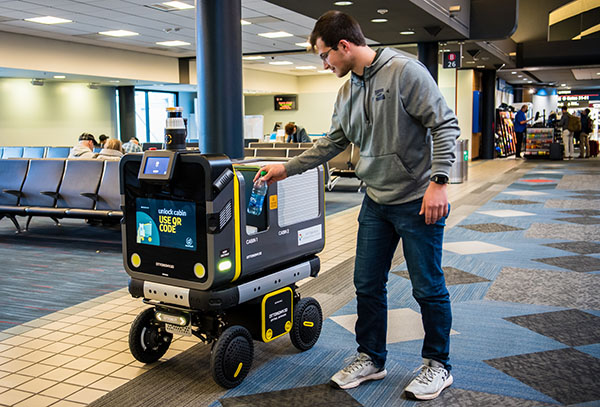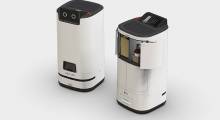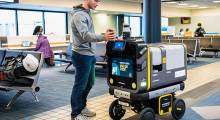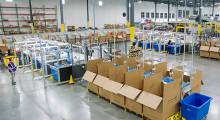While autonomous vehicles and component technologies are getting much of the spotlight at CES in Las Vegas this week, other robots are emerging. Ottonomy Inc. today showed Ottobot Yeti, which it claimed is “the first fully autonomous unattended delivery robot on the market.”
Thanks to technological advances, Research and Markets predicted that the global market for autonomous last-mile deliveries could expand from $14.13 billion in 2021 to $47.69 billion in 2026 at a compound annual growth rate (CAGR) of 27.8%. Forbes cited such deliveries as a transportation trend for 2023.
Ottonomy said it developed Ottobot to work both indoors and outdoors and to help retailers and restaurants with staffing shortages. The new robot is designed for curbside, first-mile, and last-mile contactless deliveries. It includes locker integration and can help automate the return process for retailers, according to the startup.
Ottonomy, which has offices in Brooklyn, N.Y, and Noida, India, said it expects 2023 to be the “biggest year yet” for autonomous robots. It is backed by Pi Ventures, Connetic Ventures, and Branded Hospitality Ventures.
Airport, postal pilots are successful
In pilots around the world in 2022, Ottonomy said it successfully demonstrated autonomous deliveries across a range of terrain and in varying inclement weather conditions. The company said it proved that Ottobot can provide automated deliveries for multiple use cases at scale.
“During the validation processes, we ran pilots with airports, retailers, and postal services, which gave us the deep insights we needed on the most effective use cases and scalability,” said Ritukar Vijay, co-founder and CEO of Ottonomy.IO. “With our strategic alignment with Verizon and other enterprises, we are in the prime position to fill the gap that companies like Amazon and FedEx were not able to.”
The company deployed autonomous delivery robots at Cincinnati/Northern Kentucky Airport (CVG), Rome Fiumicino International Airport (FCO), and Pittsburgh International Airport (PIT). In addition, Posten Norge in Oslo, Norway, and Goggo in Madrid, Spain, used Ottobot to automate first-mile and last-mile deliveries.
Ottonomy is also working with industry partners in Canada and Saudi Arabia and has scheduled more launches for 2023 in the U.S., Europe, and Asia.
Ottobot 2.0 rolls out
Ottonomy introduced Ottobot 2.0 in the third quarter of 2022. It described the system as “the first fully customizable and modular robot featuring interchangeable cabins and specializations based on the needs of retail, restaurants, and curbside deliveries.”
Ottobot 2.0 was designed with accessibility and directional mobility in mind, said Ottonomy. The mobile robot uses the company’s proprietary contextual mobility technology to autonomously navigate through crowded and unpredictable environments.
Ottonomy won the Mobility Startup Award given by Plug & Play Accelerator and the Sustainability Product of the Year Award for 2021 from the Business Intelligence Group.
Ottonomy offers RaaS, exhibits at CES
Ottonomy said its robotics-as-a-service (RaaS) business model helped “catalyze rapid adoption of autonomous delivery solutions, proving that fully autonomous delivery is an efficient, scalable, and sustainable solution.”
“As demand and the use cases for autonomous unassisted delivery continue to grow, we are positioned to provide robots-as-a-service for restaurants, retailers, and beyond,” said Vijay.
CES 2023 attendees can see the Ottobot Yeti in action at Booth 10700 in the North Hall of the Las Vegas Convention Center. Ottonomy was also selected as one of 40 startups in the LG NOVA’s Mission For the Future Program, which will be showcased at its Eureka Park lounge at The Venetian during CES.
Article topics
Email Sign Up


















